The Business of International SEO Ranking and How to Do It

One of the great benefits to having a website or online business is it can dramatically increase who can find your products and services. This rings especially true for internet-based businesses that provide non-physical services like digital marketing, graphic design, consulting, and so on.
The ability to pull users from a neighboring country or counties across the globe is not only possible but often a necessity for many brands to survive or thrive. Everyone knows Google and Bing hold the top spots for most popular search engines, providing the greatest opportunity to get organic traffic. This obviously means it makes sense for a website to try and get included in organic searches on Google and Bing.
However getting included just doesn’t cut it in this competitive world we live in. Merely getting included in organic results can land you on page 1,000 where no traffic will ever see your site. So the quest for getting your website to page one begins, especially if you want to grab users from multiple countries or go for a global audience.
Below we will dive into why you might want to rank across multiple countries, what search engines may consider when factoring good search results for searchers, and things you should do if you want to have the best chance of ranking intercontinentally. Along with any other considerations you may want to keep in mind if you want to do SEO internationally.
Cross Ranking Business Examples
Here are some examples where a cross-borders strategy might be warranted.
1. Local Dentist
Let’s say there’s a dentist that happens to live in a city that rests on the border between the two countries. They can provide their service to whoever comes to their location. They believe it is more beneficial for customers from the bordering country to come to them due to procedure costs. This business’s website has a ccTLD (top-level domain) and separate services pages that only support 1 language.
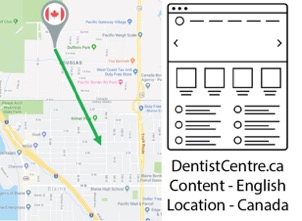
2. Tree Removal Franchise
For this scenario, our business provides tree and shrub removal. They happen to live close to a border and have 3 separate franchise locations. 2 of their physical locations are in the same country and 1 is in the neighboring country. All of the locations sit relatively close together and offer the same services. Let’s assume the website is a gTLD with separate location pages and only supports 1 language.
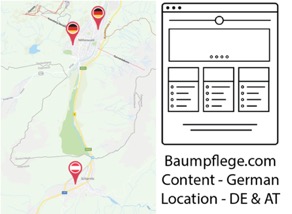
3. Multi-Language Writer
In this case, the business writes content and blogs as a service. Since the writers are fluent and experienced in multiple language and writing styles, they can service a wide variety of customers in almost any business category as long as it’s a language they support. A buyer just needs to simply order what they want and the work can be completed and delivered electronically. For this site they have a gTLD with a few different languages supported. For clarity let’s assume only 2 out of 5 languages have dedicated pages while the other 3 are automatically translated with a CMS plugin.
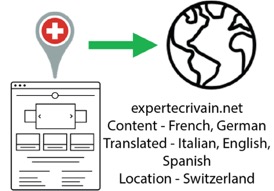
4. Industrial Machinery Worldwide
Let’s assume the company is a major provider for industrial equipment (bulldozers, excavators, cranes, etc.). Hundreds of other businesses across the globe use their products. As long as the machine is financed, the company can custom-build it to the buyers needs and shipped accordingly. They have a huge site with a lot of great product information that has built up trust. The website is a gTLD with only English content and mentions their headquarters in the United States.
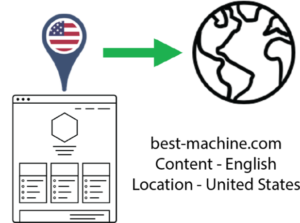
Search Input Factors
Before diving into each scenario and speculating how they might rank across different countries, we first need to look at what search engines and algorithms consider when someone does a search.
- Device Type – The type of device a searcher uses is one of the main factors when determining what and how information should be displayed in search results. This by itself can drastically alter the results as a search engine determines the relevant businesses. (mobile first indexing is a great example of this).
- Location – A device location can be pinpointed or assumed by search engines. For Google, this sets the default version (.com, .co.uk, .at, .ca etc.) and the default language if not set by a signed-in user.
- Query Type – What someone searches for (informational, transactional, educational, entertainment, local, national, etc.) has a deep and complex impact on search results. This by itself is probably why algorithm updates are becoming more frequent and varied with new logic and artificial intelligence.
- Search Language – This can drastically increase or decrease who should be included or excluded from your search. It can also help refine what content elements are served depending on use and availability.
Each of the factors outlined above can have a significant impact on the search results in varying ways. We can take a look at a few examples to see how search engines dynamically do with different searches.
As an example, if we are looking for the “best dry cleaner” using a cell phone our search result will prioritize location and device type.

If you were to do a broader query for something like “how to make tortillas” it will prioritize query type and device type
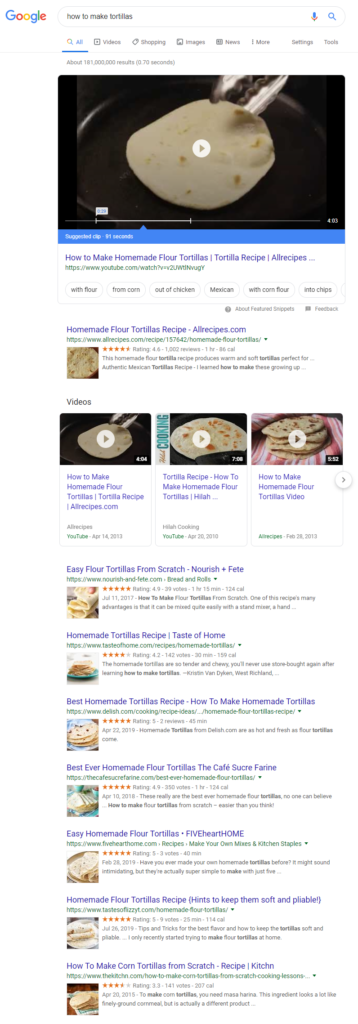
Lastly if we were to slightly change our query to be in spanish and search for “como hacer tortillas” it will prioritize search language and query type.

It is good to understand this ever-changing ranking importance especially as we look at cross country ranks.
Search Inclusion Factors
We also need to consider what a website may need to provide in order to rank across countries. These vary in importance, and in some cases have some granular nuances that can take up an entire blog themselves. We will keep this fairly concise and high-level to for the sake of simplicity.
- Domain – The domain of a website is essentially the address by which it is found. The ending or top-level domain (TLD) plays an important role in denoting how your sites fits within internet hierarchy.
- URL Structure – Having a dedicated page for services and languages helps create clear organization for search engines and users. You can solve this issue in various ways.
- Content Language – A website’s content and the language it currently supports plays a crucial factor in who (users and search engines) should find it and when. It can help give you an advantage if done correctly or put you into a massive galaxy of competition.
- Trust – A page has a value derived from backlinks, which is often discussed as authority or trust within search. This common factor helps search engines determine notable pages for topics or terms that have tons of competing content.
- Content Context – The context of a page determines who it is trying to help. This applies to individual pages and the site as a whole. It also can have some influence from external content (links and linked content).
Just like before, these factors will vary their importance and role depending on the searcher, query, and competition. Let’s take a look at some quick examples to see how these various website factors may come into play.
Examples:
If we do a broad search like “französische bulldogge“ (french bulldog) in the United States, where German is not a traditional language for the searcher (English), and search engine index (.com), the search engine will take content language, trust, and content context as priority for this search.

If we do something with a bit more context like “que voir à Rome” (what to see in Rome) in France, it makes sense that both the searcher and search engine index to return results in French. However, the search is technically for a different country. So a company in Rome could look to capitalize on a query and searcher like this. For this search we see the content context, content language, and domain play big factors in ranking.

Now, let’s do a search for a product like “electric scooter for sale in Zürich” in Switzerland. English is not an official language but is commonly used by searchers and is understood by the search engine index. We now see better localization where domain, URL structure, content language, and trust are the main factors.

At this point we should have a good understanding of how cross country and various languages impacts search results.
Cross Ranking Business Examples Assumed Rankings
We will now take our previous scenarios outlined above and guess at the logical outcome in regards to ranking. Then we will compare them to what actually happens using a few countries and scenarios to validate our guesstimated ranking results.
1. Local Business on Border
We might assume the business should easily rank into the surrounding areas regardless of country.
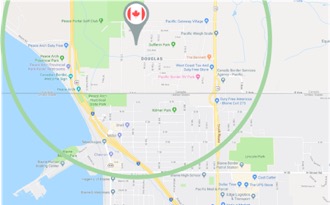
2. Tree Removal Franchise
Since the client has specific pages for each location it is probably safe to assume this client would rank well for their physical locations.
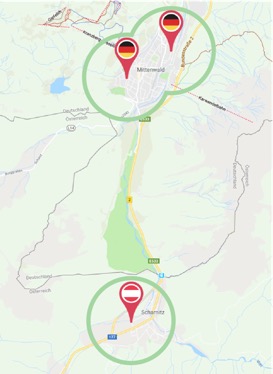
3. Multi Language Writer
We could probably assume they would show up in every search engine and language related index.


4. Industrial Machinery Worldwide
For our example business, it would be reasonable to expect they rank internationally for every search engine and language related index.


Cross Ranking Business Examples Realistic Rankings
While the assumptions made above would be an amazing, they don’t reflect accurate results very often. This is the more-likely scenarios.
1. Local Business on Border
Business reach will likely have a hard stop at the border, especially if they have a ccTLD. Even with a gTLD their reach will still be limited by the border between them and the other country.
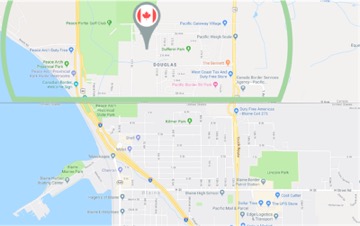

2. Tree Removal Franchise
Similar to our local business example, they will see some limitation although it will not be as bad since they have a local presence and a gTLD. But context plays a factor. This business still hits the hard border limitation, but they overcome it by having an established local presence and context.



3. Multi Language Writer
This example has much more varied possibilities than the previous two example businesses. This business becomes eligible for every index supported by the copy they write in different languages (not just plugin translated). From there, the impact and rankability becomes the bigger issue. If they write fairly generic or nonsensical content for other countries, the chances of ranking high in search results drops drastically. So while they may be included in tons of search indexes they may not get much organic search traffic.


4. Industrial Machinery Worldwide
Since this client has a robust site and a fairly niche product, they should show up really high worldwide for English searches. They face a bigger issue of isolating themselves and their products to a specific audience when it comes to search because of their content language. They further isolate themselves by having context that they only have a physical presence in the United States which can impact national results. This context can also happen from external sources as well, such as directories or article sites with links.


Cross Ranking Business Examples Business/Strategy Needs
Now we have the reality of where our plausible businesses could rank, and what can be done to help get them the results they want. As stated at the beginning of this article, international ranking can sometimes make the difference between a business merely thriving or surviving. So let’s take a quick look at each of our example businesses and what they could do to better their chances of ranking in different countries.
1. Local Business on Border
The business currently has a ccTLD which does segment them into their country. Getting a gTLD would help open them up to more opportunities. Since their content and language (English) applies to the country they try to rank in (United States), there’s no translation needed. This business has two main things they can do to help pull in more business from the United States.
They first need to write blogs and content around why they believe getting procedures done by them in Canada could help residents in the United States. This route is generic, but would have the most lift (rankings and traffic) from an organic standpoint. If they truly just want to pull business from a local town on the other side of the border, they need to deploy option two. They would need to create localized service pages targeting the specific location. This would require some research around how to phrase the content and not over-stuff the location to compete with local businesses.
Both of these approaches only work for the organic section and would require a lot of authority building, content revisions, and time. However, they will achieve the cross country ranking desired by the business.


2. Tree Removal Franchise
Considering they have physical locations in different countries, and a gTLD, they almost have no limitations. However they still run into the same issues from a national standpoint as everyone else. If they want to expand locally, they simply have to tailor their content to the areas they want to target. However, anything national still has competition and intent to deal with. And that’s an entirely different blog. Overall, the high-level view when it comes to competing nationally is; They need to make sure their content matches and is better than the content of those who show up on the first page for their desired search. If they have the content, then they can begin working on the authority piece by sharing their content and naturally acquiring authority over time.


3. Multi-Language Writer
For our writer, they have the right structure in place with a gTLD. They also have the start of what they truly need by having two out of their five supported languages fully translated with hard content. They simply need to work on translating the other three versions so they have five truly separate copies of their website. Ideally this should all be within a sub-folder (example.com/en/page1, example.com/fr/page1, etc.) to help keep things simple for search engines crawling. The translated copies will act as the core foundation to get them started on ranking internationally for their services. After they complete those tasks, they can begin to really localize their content to the audience they are trying to reach.
They should ideally do this at both a country and area level (providence, city, state, village, county, etc.). This will help achieve not only rankings but trust with their target audience. For this scenario, we recommend starting on the weakest content (worst rankings/traffic) or the content with the most opportunity.


4. Industrial Machinery Worldwide
As for our mega business they have the most to do, but they also should have the most resources (time, money, and people) to accomplish their goals. They already have a gTLD, a good start for ranking internationally. They will need to work on translating their product and service copy into respective sub-folders (/en, /fr, /de, etc.). Again this will help keep the organization, crawling, and authority attribution easy for search engines. Depending on the company size or organizational structure, using a sub-domain may make more sense. However, using a sub-domain may prove difficult from a crawling standpoint. It will also have problems regarding authority attribution since search engines most likely consider sub-domains a separate domain entirely. (Although there is some speculation about sub-domains and ranking. For more information, check out these sources (1)(2)(3).)
Just like our writer example, this company will need to work on localizing their content once they get their core content translated. This may require hiring dozens of local writers and professionals. Depending on how local they want to get they may need to look at creating a physical presence. This would be the best way to help establish them locally, but is also the most time-consuming and expensive in the long run.


Other Considerations for International Ranking
I want to provide some considerations you may want to consider. Whether you are a webmaster, business owner, or simply learning about international SEO.
In-Country Expansion
When looking to expand into another country or even internationally, one should always consider if they can do more within their country. It may seem really obvious, but the simple exercise of evaluating your reach with tools like Sistrix and SEMRush may reveal a wealth of knowledge. You may discover your reach is not as expansive as you initially thought within your own country. Or you may find hidden or missing opportunities that can yield huge benefits without much effort. Always double check your native country before assuming you should jump into ranking for another.
Blogging and Education
In the never-ending quest for more traffic and rankings, blogging efforts will never hurt. Blogging can be overlooked for those looking to expand across borders. In my opinion, blogging and educational content should be some of the first content you create with the intent of ranking internationally. I say this because a simple blog allows you to be more generic than service or product pages, while allowing the flexibility of personal feelings and opinions. It also allows for broader queries which can help your content show up with minimal or no authority. Blogging and educational content has another benefit of helping expand your customer funnel as well by opening up brand exposure and messaging early stages of the buying/decision process.
Content, Beyond Text
Similar to blogging and education comes content, specifically non-text content. We often get so wrapped up in writing content that we overlook other content pieces that really help make a website unique and amazing. So if you’re considering international ranking expansion, start looking at more graphics, videos, tools, or other interactive content for your website This can make the difference between not only better customer experiences, but also better conversions, rankings, and then down the road international search expansion.
Searcher Intent
This is a big one for me and my daily work so this will be a slight rant. The intent of what a searcher looks for has a lot to do with what shows up in search results. If a user wants to buy something, there is a good chance search results will reflect that. The same goes for someone looking to read and learn about a subject. The list goes on and on for almost every intent for an internet search. Keep this intent in mind when you look at keywords. Don’t get sucked into search volumes, opportunity scores, difficulty metrics, or competition indexes. Regardless of the stats or data, if the intent doesn’t match what your page and content has to offer, YOU WILL NOT RANK. Always do your due diligence and look at who else ranks for your industry and understand why by looking at their content.
Search Engine Goals
This last bit I feel gets shuffled and lost in the daily mix of algorithm headlines and breaking SEO news feeds. However, it’s probably the best thing to remember. And if I was a braver man I would get it tattooed on my chest. The goal of a search engine is to find the best information for a users search. This helps establish trust and re-use for the search engine and it helps the user accomplish their goals and tasks. Essentially a win/win with advertisers and business owners mixed in the middle between ads, products, and services.
The reason this is so important is that they are looking to help the user. Which means if you also look to help the user over time they should begin to help you as well. If you align your goals and work with the search engines then you will naturally do what’s needed, and over time you will reap the benefits without worry or effort.
Just to close things out, ranking in different countries can be rewarding. It simply requires the right infrastructure, content, and search results. By no means is it the only way to expand an online business, but it can make sense for a lot of business and websites. Remember SEO is a long-term marketing strategy and requires iteration and experimentation. Don’t be afraid to trial something small and change it if needed.
As always if you have any questions about your situations or want an opinion, feel free to hit me up on Twitter @BigCSEO and keep boosting!

